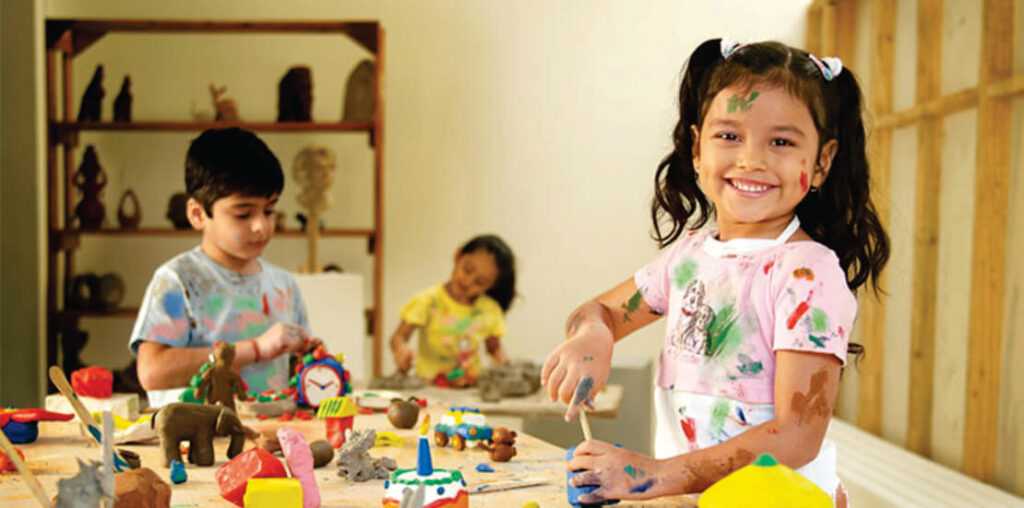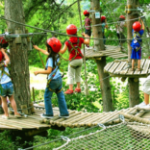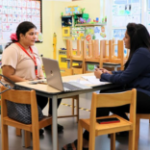
In the world of early childhood education, the term “play” often conjures images of children frolicking, giggling, and exploring in carefree abandon. However, beneath the surface of these seemingly simple activities lies a profound and essential aspect of learning: play-based education. Far from being just a frivolous pastime, play serves as a cornerstone of early childhood development, fostering critical skills and laying the foundation for future academic success. In this blog, we delve into the crucial role of play in early childhood education and explore why play-based learning matters.
Understanding Play-Based Learning
At its core, play-based learning is a pedagogical approach that recognizes play as a primary vehicle for children’s exploration, experimentation, and understanding of the world around them. Rather than relying solely on structured lessons and direct instruction, play-based learning embraces the innate curiosity and creativity of children, allowing them to learn through hands-on experiences and social interactions.
The Power of Play in Development
Play is not merely a form of entertainment; it is a fundamental aspect of human development. Through play, children engage in activities that promote cognitive, social, emotional, and physical growth. From building elaborate block structures to engaging in imaginative role-play scenarios, each play experience contributes to various areas of development:
1. Cognitive Development: Play stimulates cognitive skills such as problem-solving, critical thinking, and spatial awareness. Whether children are sorting shapes, counting objects, or experimenting with cause and effect, they are actively constructing their understanding of mathematical and scientific concepts through play.
2. Social Development: Play provides opportunities for children to interact with their peers, negotiate roles, and develop essential social skills such as cooperation, communication, and empathy. In collaborative play settings, children learn to navigate social dynamics, resolve conflicts, and work towards common goals, laying the groundwork for healthy relationships later in life.
3. Emotional Development: Play offers a safe space for children to express and regulate their emotions. Whether they are pretending to be superheroes, exploring their fears through dramatic play, or engaging in symbolic storytelling, children use play as a tool for processing their feelings and developing emotional resilience.
4. Physical Development: Play promotes gross and fine motor skills as children run, jump, climb, and manipulate objects in their environment. Whether they are engaged in outdoor games, constructing with blocks, or engaging in sensory play activities, children strengthen their muscles, refine their coordination, and develop spatial awareness through active play.
Play-Based Learning in Practice
In play-based learning environments, educators serve as facilitators rather than dictators of learning. They create rich, stimulating environments filled with open-ended materials that invite exploration, experimentation, and discovery. From sensory tables and dramatic play corners to art stations and outdoor play spaces, every element of the classroom is intentionally designed to inspire children’s curiosity and creativity.
Through observation and documentation, educators gain insights into children’s interests, strengths, and areas for growth, allowing them to tailor their curriculum to meet individual needs. They scaffold children’s learning experiences by asking open-ended questions, providing appropriate challenges, and supporting their investigations without imposing predetermined outcomes.
The Benefits of Play-Based Learning
The benefits of play-based learning extend far beyond the early years, shaping children’s attitudes towards learning and preparing them for success in school and beyond. Here are some key advantages of this approach:
1. Promotes Engagement: Play-based learning captivates children’s interest and motivation, making learning inherently enjoyable and meaningful. When children are actively engaged in play, they are more likely to retain information, develop skills, and explore new ideas with enthusiasm.
2. Fosters Creativity: Play encourages divergent thinking, imagination, and innovation. By engaging in imaginative play scenarios and exploring open-ended materials, children unleash their creativity and develop the ability to think outside the box—a skill that is invaluable in an ever-changing world.
3. Supports Intrinsic Motivation: In play-based environments, children take ownership of their learning experiences, fostering a sense of autonomy and self-direction. Rather than relying on external rewards or punishments, they are intrinsically motivated to explore, experiment, and discover at their own pace.
4. Cultivates Resilience: Play provides opportunities for children to encounter challenges, make mistakes, and persevere in the face of setbacks. Through trial and error, they develop resilience, resourcefulness, and a growth mindset—the belief that their abilities can be developed through effort and practice.
5. Enhances Social Skills: Play-based learning promotes collaboration, communication, and cooperation among peers. By engaging in shared play experiences, children learn to navigate social interactions, resolve conflicts, and develop empathy—a foundation for building positive relationships throughout life.
Overcoming Challenges and Misconceptions
Despite the wealth of evidence supporting play-based learning, it continues to face challenges and misconceptions in educational discourse. Some critics argue that play is frivolous and lacks academic rigor, advocating for a more structured approach to early childhood education. However, research suggests that play and academic learning are not mutually exclusive; rather, they complement and enrich each other.
Others raise concerns about accountability and assessment in play-based settings, fearing that children’s learning may not be adequately measured or documented. However, proponents of play-based learning emphasize the importance of using developmentally appropriate assessments that align with the principles of observation, documentation, and reflection.
Discover Playful Learning at Tiny Tots School
At Tiny Tots School, children are welcomed into an environment where the transformative potential of play in early childhood education is fully embraced. The school’s philosophy revolves around the belief that children thrive when they are actively engaged in hands-on experiences and meaningful interactions. Through a carefully crafted play-based curriculum, Tiny Tots School provides dynamic learning environments that ignite curiosity, fuel imagination, and cultivate essential skills for lifelong learning. From vibrant classrooms to stimulating outdoor spaces, every aspect of the school is meticulously designed to inspire exploration, creativity, and discovery. With a team of dedicated educators who serve as facilitators of learning, Tiny Tots School nurtures each child’s unique talents and interests, fostering a deep-rooted love for learning that extends far beyond the classroom. At Tiny Tots School, play isn’t merely a pastime—it’s the cornerstone of academic success, social-emotional development, and joyful learning experiences. Families are invited to join the Tiny Tots community in embracing the power of play and unlocking their child’s full potential.
In conclusion, play-based learning holds immense promise as a transformative approach to early childhood education. By honoring children’s natural inclination to play, educators can create vibrant learning environments where curiosity thrives, creativity flourishes, and lifelong learning is cultivated. As we continue to champion the importance of play in education, let us recognize its profound impact on children’s development and advocate for its integration into educational policies and practices worldwide. After all, in the words of the renowned educator Fred Rogers, “Play is often talked about as if it were a relief from serious learning. But for children, play is serious learning. Play is really the work of childhood.”




